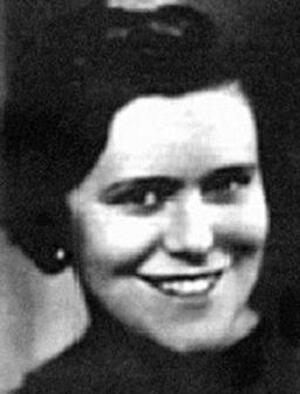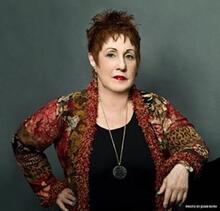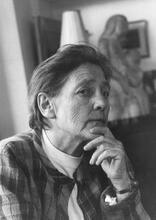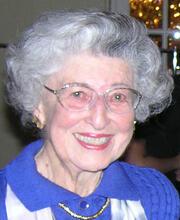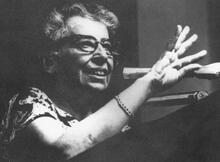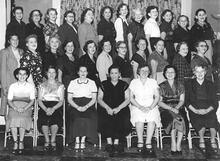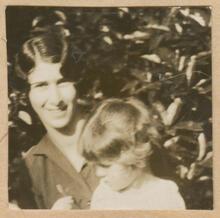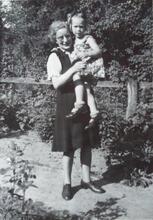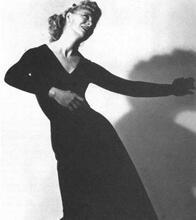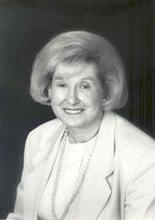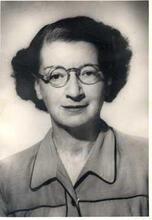Else Frenkel-Brunswik
Else Frenkel-Brunswik was an influential social psychologist who studied authoritarian personalities and the psychology of antisemitism during the Second World War. Undated. Source: Familypedia.
Else Frenkel-Brunswik was born in the Lemberg (Lvov), in the Austrian-Hungarian Empire in 1908. Following the outbreak of World War I and anti-Jewish pogroms, her family emigrated to Vienna, where her parents encouraged and supported her education in psychology at the University of Vienna. While working as a research assistant at the Psychological Institute, she met Egon Brunswik, who left Vienna to teach at the University of California at Berkley in 1937. Soon, after Germany annexed Austria, Else fled to the United States, reuniting with Egon and marrying him in June 1938. During World War II she began researching the psychology of antisemitism, and in 1950 Frenkel-Brunswik published the groundbreaking study The Authoritarian Personality with several other scholars.
Else Frenkel-Brunswik was a social psychologist who is best known as coauthor of The Authoritarian Personality. She devised a measurement scale for ethnocentrism and authoritarianism to test hypotheses concerning prejudice in individuals and groups. Having personally experienced antisemitism in Austria, she was well aware of its dangers and sought to explain its psychological underpinnings.
Early Life and Education
Else Frenkel-Brunswik was born in the city of Lemberg (Lvov), Galicia, in Austria-Hungary on August 18, 1908. After the outbreak of World War I, her parents, Abraham and Helene (Gelernter) Frenkel, moved the family to Vienna in the aftermath of anti-Jewish pogroms. The middle child of three sisters, her father, a banker, encouraged her intellectual development.
After earning her doctorate in psychology under Karl Bühler at the University of Vienna in 1930, she worked as a research assistant to Charlotte Bühler in the Psychological Institute until 1938. She underwent psychoanalysis with Ernst Kris and was attracted to the ideas of the “Vienna School” of logical positivism, together with her colleague Egon Brunswik, whose family belonged to the Hungarian nobility. Having received a Rockefeller Foundation Fellowship, Egon Brunswik joined the faculty of the University of California at Berkeley in 1937. After the Nazi Anschluss, Else Frenkel immigrated to the United States. She married Egon Brunswik in June 1938 despite her parents’ objections to this intermarriage.
Contributions to Social Psychology
Because of university nepotism rules, Frenkel-Brunswik could not receive a tenured position at Berkeley, even though she often taught seminars. Instead she was designated a research associate in the Institute of Child Welfare and a research psychologist and psychotherapist at Cowell Memorial Hospital. During World War II, she helped design and launch psychological studies of antisemitism. Working together with Theodor Adorno after the war, her efforts culminated in the publication of the groundbreaking study The Authoritarian Personality in 1950. She also conducted research on prejudice in children, “intolerance of ambiguity,” and the process of aging, as well as the psychology of personality.
In 1950, she was a visiting lecturer and research consultant at the University of Oslo and held a fellowship at the Center for Advanced Study in the Behavioral Sciences at Stanford University from 1954 to 1955. Her scholarly productivity ended in 1955, however, with her husband’s suicide following a long illness. She never recovered from the shock of his death and suffered from severe depression. Her colleagues in the psychology department at Berkeley voted unanimously for her appointment to full professor in 1957, since nepotism regulations no longer applied, but this gesture in recognition of her achievements came much too late to be of comfort to her. She died of a drug overdose on March 31, 1958, five months before her 50th birthday.
Else Frenkel-Brunswik made significant contributions to the development of social and clinical psychology in the United States. A hard-working scholar and a dedicated teacher, she demonstrated great personal commitment to her work. Like other married women academics of her day, she experienced discrimination due to anti-nepotism rules and, like many intellectual emigrés, did not receive the appreciation she deserved during her lifetime.
Selected Works:
with Adorno, T.W., Daniel J. Levinson, and R.N. Sanford. The Authoritarian Personality. New York: Harper, 1950.
“Intolerance of Ambiguity as an Emotional and Perceptual Personality Variable.” Journal of Personality 18, no. 1 (1949): 108–143.
Motivation and Behavior. Genetic Psychology Monographs, vol. 26, no. 2. Provincetown: The Journal Press, 1942.
“Personality Theory and Perception.” In Perception: An Approach to Personality, edited by R.R. Blake and G.V. Ramsey, 356-419. New York: Ronald Press Co., 1951.
“Psychoanalysis and the Unity of Science.” Proceedings of the American Academy of Arts and Sciences 80, no. 4 (1954): 273–347.
with Weisskopf, Efith. Wunsch und Pflicht in Aufbau des Menschlichen Lebens (Desire and Duty in Building Human Life). Vienna: Gerold, 1937.
Biographical Dictionary of Psychology. Edited by Leonard Zusne (1984).
“Else Frenkel-Brunswik, 1908–1958.” American Sociological Review, 23, no. 5 (1958): 585–586.
Fischer, Kurt Rudolf. “Egon Brunswik und Else Frenkel-Brunswik.” In Vertriebene Vernunft. Edited by Friedrich Stadler. Vol. 2 (1987): 306–308.
Heiman, Nanette, and John Grant, eds. Else Frenkel-Brunswik: Selected papers. Psychological Issues. Vol. 8, no. 3 (1974).
International Biographical Dictionary of Central European Emigres. Vol. 2, part. 1 (1980): 325.
International Encyclopedia of the Social Sciences. Vol. 5. Edited by David L. Sills (1958): 559–562.
NAW modern.
Smith, M. Brewster. “Else Frenkel-Brunswik (1908–1958).” In Women in Psychology: A Bio-Bibliographic Sourcebook, edited by Agnes N. O’Connell and Nancy Felipe Russo (1990): 88–95.
Stevens, Gwendolyn, and Sheldon Gardner. The Women of Psychology. Vol. 2 (1982): 129–134.
Watson, Robert I., ed. Eminent Contributors to Psychology. 2 vols. (1974, 1976).

